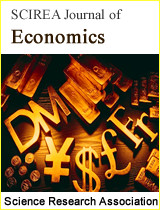Analysis of Market Equilibrium based on the New Theory of Value
DOI: 10.54647/economics79260 116 Downloads 15077 Views
Author(s)
Abstract
Based on the axiomatic assumptions that the law of diminishing marginal utility, non-satiation assumption and social choice assumption based on personal preference, Arrow and Debreu study general equilibrium problems whose scope of research only involves the quantity, utility and price of commodities. Therefore, the conclusion can only explain the phenomenon of general equilibrium in the process of quantitative change, but not the non-equilibrium phenomenon in the qualitative change process. In view of the above problems, this paper will expand the research content to the range of quantity, quality, time, labor value, use value, value, exchange value and price based on the new theory of value, to comprehensively analyze the phenomenon of quantitative change and qualitative change in the process of commodity exchange, give the mathematical explicit and general solution of the unified price function of equilibrium and non-equilibrium, and prove the existence, uniqueness and stability of extremum solutions of various price functions. The purpose of this paper is to reveal the general economic law in the process of commodity exchange. At the same time, it will also briefly analyze why the general equilibrium theory can cause the errors of incompleteness, incompatibility and cyclic argumentation.
Keywords
new theory of value, value, price, metric, fixed point, market equilibrium
Cite this paper
Jie Wu, Zili Wu,
Analysis of Market Equilibrium based on the New Theory of Value
, SCIREA Journal of Economics.
Volume 6, Issue 4, August 2021 | PP. 71-113.
10.54647/economics79260
References
| [ 1 ] | Aristotle. Politics, translated by Benjamin Jowett. Kichener: Batoche Books, 1999. |
| [ 2 ] | Arrow, K. J. Social Choice and Individual Values (1951) 2nd ed. New Heaven, CT: Cowles Foundation, Yale University, 1970 |
| [ 3 ] | Arrow, K. J., & Debreu, G. Existence of an Equilibrium for a Competitive Economy, Econometrica, 1954, Vol. 22, No. 3, 265-290 |
| [ 4 ] | Arrow, K. J., Intriligator M. D. Handbook of Mathematical Economics, Volume 1 (1981). North Holland, 1987) |
| [ 5 ] | Banach, S. Sur les opérations dans les ensembles abstraits et leur application aux équations intégrales. Fund. Math. 1922, 3: 133-181 . |
| [ 6 ] | Debreu, G. Theory of Value: An Axiomatic Study of Economic Equilibrium. New York: Wiley, 1959. |
| [ 7 ] | Hicks, J. R. & Allen, R. G. D. A Reconsideration of the Theory of Value. Economica, 1934, 1(1), 196-219. |
| [ 8 ] | Jeffery, A. Advanced Engineering Mathematics. Harcourt/Academic Press, 2002. |
| [ 9 ] | Jevons, W. S. The Theory of Political Economy (1871), 5th ed. New York, Sentry Press, 1965 |
| [ 10 ] | Marx, K. 1867. Das Capital, Vol.I, in Marx and Engels: Collected Works, Vol. 35. London, Lawrence & Wishart (1996) |
| [ 11 ] | Nash, J. Non-Cooperative Games. The Annals of Mathematics, 1951, 54: 286-295. |
| [ 12 ] | Pareto, V. Manuel d’ Economic Politique (Manual of Political Economy) deuxieme edition (1906). Paris, M. Giard, 1927. |
| [ 13 ] | Richardo, D. On the Principles of Political Economy and Taxation (1817). Kitchener, Batoche Books, 2001 |
| [ 14 ] | Rockafellar, R. T. Convex analysis. Princeton: Princeton University Press, 1970. |
| [ 15 ] | Smith, A. An Inquiry into the Nature and Causes of the Wealth of Nations (1776). New York, Random House, 1994 |
| [ 16 ] | Neumann, J. V. , Morgenstern, O. Theory of Games and Economic Behavior. Princeton University Press. 1953 |
| [ 17 ] | Walras, L. Elements of Pure Economics (1874). Translated by W. Jaffe, London: Allen and Unwin (1954) |
| [ 18 ] | Wang J.H. Introduction to Topology, Shanghai Science and Technology Press, 1978 |
| [ 19 ] | Wang G., Zhou Z., Zhu S., Wang S. et al. Ordinary differential equations (3rd Ed.). Beijing: Higher Education Press, 2006 |
| [ 20 ] | Wu, J., Makarov, V. L., Bakhtizin A.R., Wu, Z. et al. The New Theory of Value, Economics and Mathematical Methods, 2020, 56(4):5-19. |
| [ 21 ] | Yang, X. & Borland, J. A Microeconomic Mechanism for Economic Growth, Journal of Political Economy, 1991, vol. 99, no. 3, 460-482. |
| [ 22 ] | Yu, J.R. Complex Variable Function (3rd edition). Beijing: Higher Education Press. 2000 |

